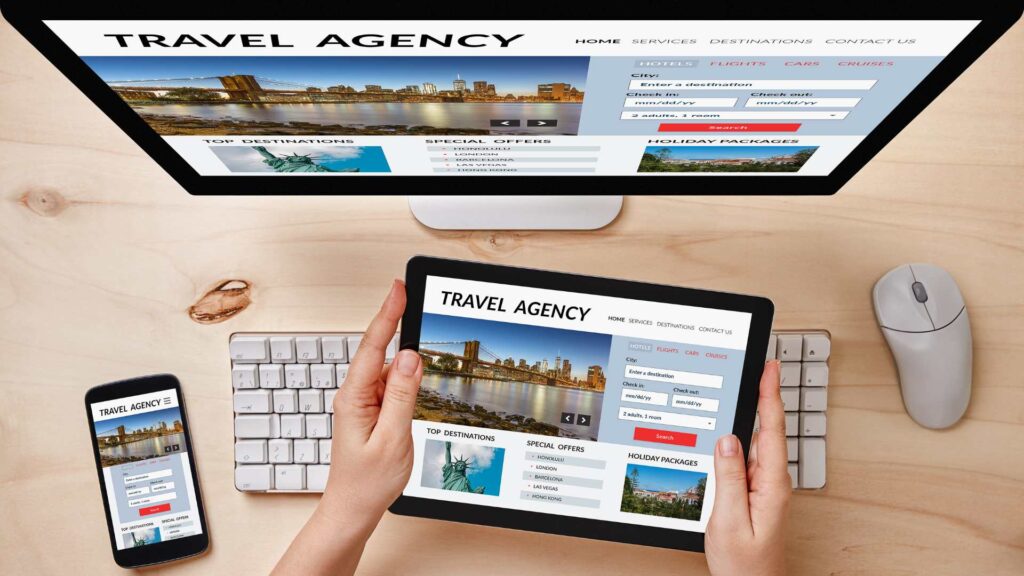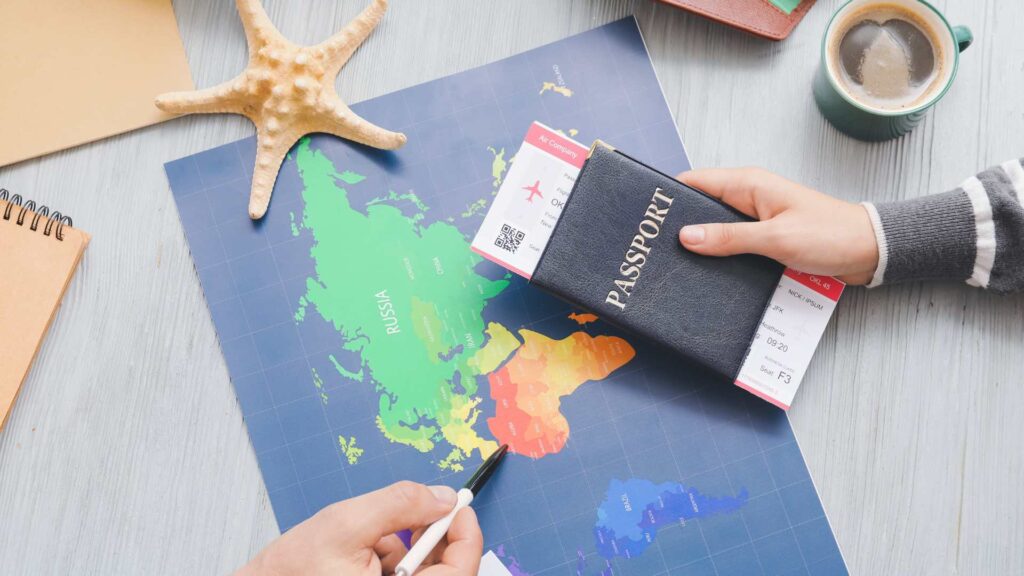For all those out there who have formed the typical group where they are the ‘planner’, you know how awesome it feels to plan the perfect trip. Interesting places, inventively designed food outlets, and interesting activities—within the coverage of a reasonable price range. You can turn those skills into a flexible career as a travel agent.
Despite the popularity of automated booking systems for vacations, travel agents are in demand for trips that require thoughtful planning and expertise. Travel agents ensure travel plans, such as activities and costs, receive a personalized touch while often providing clients with the best value for their money. Understanding the steps and requirements it takes to earn this role may help you begin your career and increase your chances of job success.
In this blog, we will explain How to become a travel agent in India. In the end, we will also answer some of the most common questions about this career path.
What do travel agents do?


Travel agents help clients make travel arrangements or explore different travel package options. They may propose certain enemies or locations, and they can assist people plan a trip. A travel agent can also organize flight bookings, hotel bookings, and making of reservations. To be able to make travel arrangements, travel agents need to gather information about their clients such as budget, time constraints, dream vacation, and mode of transport. For instance, a travel agent who finds that a client is claustrophobic will recommend a flying trip over cruising.
Also, travel agents may receive involved questions on national and/or international travel like explaining to a client which health measures a certain airline or certain countries are employing in their current operations. It can therefore come in as a cushion between the consumer and travel suppliers.
A travel agent also has various duties that can change daily based on their client or agency work, but some typical responsibilities for this role include:
- Bargaining with hotels to agree on the charges for clients
- Assisting clients in making travel itineraries
- When self-schedules flex or clients call on this position to attend their events
- Estimating and defining travel costs and making the client spend less.
- Guiding the clients as to what occasion is going on in the region they intend to visit
- Advising the clients on the documents that they need to carry on their journey such as passports.
- Prescribing requirements for crossing the border to clients in the course of the conversation.
Travel agent career paths
It is therefore clear that travel agents should be able to work independently and exhibit a lot of sales skills. Usually, they can go one of the following ways in terms of employment:
- Host agency: Contract with a host company as an independent contractor for training, partnership, and accounting assistance. Categorized by total start-up costs, this pathway can enable new travel advisors easily to begin.
- Travel franchise: Franchise with an already existing travel agency company and have the authority to operate a shop on your own. This means that a franchiser is acquired together with some overhead costs, but s/he can provide training. You are in a position to hire independent contractors also since it is your own business.
- Travel Company: Address bookings in a manner that you are an employee in an organization that has been in existence. This usually concerns standard working hours and remuneration but you will have relatively lesser control.
Learn How to Become a Travel Agent


1. Skills and qualifications required as a travel agent
A travel agent requires a specific set of skills and qualifications to handle travel arrangements and to provide an exceptional customer experience. These go beyond understanding destinations and knowing how to book flights. They include a holistic knowledge of the industry, hard skills, and a personal touch that ensures clients have the best travel experience possible. Below is a list of key skills and qualifications for a travel agent:
Travel industry knowledge
Since you will be organizing and marketing travel experiences, you should have a general knowledge of, current and trending tourist attractions, traveling safety, and traveling documents such as passports and visas. This will give confidence to your clients and assist in recommending the best product depending on the interest of the client.
Technological skills
Working for this career you will have to make use of computer reservation systems, online research technologies, and even such social outlets to interact with clients. Hence, the mastery of some technical skills is indispensable when it comes to managing the practicalities of traveling.
Communication skills
To be able to provide relevant information to their clients, travel agents should be efficient in passing knowledge to the travelers thus when explaining certain policies, recommending destinations, or dealing with an angry customer. Another way that communication can improve your clients’ experience is dependent on you.
Sales skills
Being a travel agent, your work will involve the dissemination of travel portfolios and the sale of travel portfolios. This will call for sales skills so that you can easily persuade the clients of the need to employ your expertise and advice.
Detail oriented
The job of a travel agent involves many tasks – tickets and dates, accommodation and leisure activities, and many others. Consequently, agents need to have keen details since they are responsible for managing everything.
Suggested Read: How to Start an NGO in India
2. Educational requirements and training


While there is no specific degree required to become a travel agent, certain educational backgrounds can be beneficial:
High School Diploma or GED: Employment of travel agencies demands at least a high school diploma for employment for almost all travel agencies.
Higher Education: However, experience in the hospitality, travel, or business fields is preferred but not essential though a degree in any of these fields can be an added advantage.
Additionally, formal training can be beneficial:
Travel Agent Certification Programs: Several different organizations and internet sites provide certification that gives information and practice in the field.
Industry Workshops and Seminars: These can enable you to be in touch with the new trends and developments in the travel market.
3. Gaining experience
The travel industry is very competitive, and therefore, experience is very important in this business. Here’s how you can gain relevant experience:
Work in Retail or Customer Service: It is possible to acquire the necessary skills if a candidate has worked in retail or has been a customer service attendant.
Internships: There are some internships that one can take in a travel agency as a way of gaining practical experience and knowledge.
Freelance or Part-Time Work: It is advisable to start as a freelance or a part-time travel agent to establish a client base and accumulate the needed experience.
4. Getting certified
While certification is not always required, it can enhance your credibility and career prospects:
Certified Travel Associate (CTA): This certification is available from The Travel Institute and proves your understanding and dedication to the sector.
Certified Travel Counselor (CTC): This certification is for agents who have been practicing for several years and wish to escalate their career levels.
Specialty Certifications: You might want to get additional certifications in certain specialties like cruise planning or detailed specialization on certain destinations as additional products.
5. Building your network and starting your agency


Networking is crucial in the travel industry:
Join Industry Associations: There are some professional groups for example the American Society of Travel Advisors (ASTA) that have access to networks.
Attend Trade Shows and Conferences: What is more, these events are great for meeting with suppliers, getting information about new products, and detecting recent tendencies in the market.
Connect with Other Travel Agents: Relationships that can be developed with other professionals can come in handy when one is needed.
You have a couple of options for working as a travel agent:
Work for a Travel Agency: It is not uncommon for new agents to enter the profession and work for experienced agencies to learn from them.
Start Your Agency: If you are an aspiring entrepreneur, you can own a travel agency of your own. This will call for a business plan, marketing strategy, and start-up capital.
6. Marketing Your Services


Effective marketing is crucial for attracting clients. Here’s how to market yourself as a travel agent:
Create a Professional Website
- Design: Ensure your business website is visually appealing, easy to navigate, and mobile-friendly.
- Content: Include information about your services, client testimonials, and useful travel tips.
- SEO: Optimize your website for search engines with On-Page Search Engine Optimization strategies to improve your visibility online.
Utilize Social Media
- Platforms: Leverage platforms like Facebook, Instagram, and LinkedIn to connect with potential clients and share travel-related content.
- Engagement: Regularly post engaging content such as travel tips, destination highlights, and special offers.
- Advertising: Consider using paid advertising on social media to reach a broader audience.
Offer Excellent Service
- Word-of-mouth referrals: Providing exceptional service can lead to positive reviews and referrals from satisfied clients.
- Follow-Up: Stay in touch with clients after their trips to gather feedback and encourage repeat business.
Use Email Marketing
- Newsletters: Send out regular newsletters with travel deals, destination highlights, and useful travel tips. Try cold email software for it.
- Personalization: Tailor your email content to individual client preferences and past travel history.
Attend Networking Events
- Industry Events: Attend travel industry events and trade shows to meet potential clients and partners.
- Local Events: Participate in local community events and fairs to raise awareness about your services.
Develop Partnerships
- Local Businesses: Partner with local businesses, such as hotels and restaurants, to offer exclusive deals and promotions.
- Influencers and Bloggers: Collaborate with travel influencers and bloggers to reach a wider audience.
Conclusion
Becoming a travel agent is indeed a very rewarding career for someone passionate about travel and exploring new places.
I hope this blog provides you with the guide you need to make a career in a travel agency.
Whether you choose to work for an established agency or start your own, the key is to provide exceptional service and continuously seek opportunities for growth and learning.
Happy travels on your journey to becoming a travel agent!
Suggested Read: How to become an Interior designer
FAQs
1. Is it compulsory to have a degree to become a travel agent?
As far as education is concerned there is no particular degree that has been made mandatory for a person to become a travel agent. But desirable are completed education in hospitality, travel, and business. Commonly, most travel agents have at least a high school degree, though most learn their trade through certification and experience.
2. How much does a travel agent earn?
Salary can be big or small depending on things like experience, area of work, and designation among others. The travel agents’ average incomes depend on the median annual wage which in 2023 was estimated to be approximately $4500 as estimated by the U. S. Bureau of Labor Statistics. Those employed on commission or operating their agencies may have better ranges of pay.
3. What are the advantages of travel agents’ certification?
Certification can also add substance to the candidate’s claims, proving the level of his/her involvement in the scope. It can also create new career possibilities, grant access to professional tools, and create differentiation in a competitive world of work.
4. How do I attract clients?
Unlike other travel agent businesses, there are specific ways on how one can get new clients as a new travel agent. Marketing one’s practice to consumers takes time and resources. Begin with a personal circle, building online profiles, and providing the customers with the best service they can get from their first contractor. One can also opt to become a member of industry associations and participate in networking events so that one can land more clients in that field.

